what happens when we choose efficiency at the expense of our humanity?
a case for taking the scenic route when all these shortcuts just become the regular path
There is a story about an envelope that I think about a lot. Maybe even once a week. The story is Kurt Vonnegut’s, and he once told it to journalist David Brancaccio in a CBS interview on October 17th, 2005. The story, as told in the interview, goes like this:
DAVID BRANCACCIO: There's a little sweet moment, I've got to say, in a very intense book — your latest — in which you're heading out the door and your wife says what are you doing? I think you say — I'm getting — I'm going to buy an envelope.
KURT VONNEGUT: Yeah.
DAVID BRANCACCIO: What happens then?
KURT VONNEGUT: Oh, she says well, you're not a poor man. You know, why don't you go online and buy a hundred envelopes and put them in the closet? And so I pretend not to hear her. And go out to get an envelope because I'm going to have a hell of a good time in the process of buying one envelope.
I meet a lot of people. And, see some great looking babes. And a fire engine goes by. And I give them the thumbs up. And, and ask a woman what kind of dog that is. And, and I don't know…
And, of course, the computers will do us out of that. And, what the computer people don't realise, or they don't care, is we're dancing animals. You know, we love to move around. And, we're not supposed to dance at all anymore.

I have often thought about this story on the days when I’ve worked from home, sitting at my desk, jumping from meeting to meeting, replying to Slack message after Slack message, worrying about deadline after deadline. Very much not being a dancing animal, very much not moving around.
I think about this story when my stomach starts to rumble, and I consider walking to the deli that sits an 82 second walk away from my front door – a quick walk past my Italian neighbour who cleans his car every other day. It is a deli where I could choose from 16 different options of bagel fillings to have for lunch. I think about how I would probably choose what I always choose: a poppy seed bagel (if they haven’t run out yet) with cream cheese and sliced tomatoes, from the man who always asks me how I am and compliments my hats. I think about how while I wait for my bagel, I could stand outside in the fresh air, probably crouch down to say hello to around one or two (if I’m lucky) good dogs and make conversation with some interesting people whose days have also led them to be stood outside this deli at this very moment.
This entire process would likely take me around 30 minutes on a spectacularly busy deli day. But in that short space of time, I know that the fresh air, the brief change of scene and all those interactions (no matter how small) will return me to my desk with a significant impact on my mood, energy levels and ability to dive back into the creative process. I will have stood up straight, moved my body and engaged in real life instead of the one that lives on my laptop. And yet…
More often than not, my to-do list leans over my shoulder and tells me that I cannot spare those 30 minutes to do this small thing that would make a huge difference to the rest of my day. He (yes, my to-do list is a man) tells me I don’t have time, and fills my brain with tasks and deadlines (some real, some fake) and all the ‘just a quick one!’ requests from other people who are making their urgencies my emergencies. He tells me I am too busy to leave my desk. He tells me I need to wade through my tasks, despite running off less energy, less clarity and less enthusiasm. He tells me that I should use those 30 minutes to get all my work done (which really, is just putting out fires that someone else carelessly started), even though we both know I will likely get sucked into scrolling on my phone, or clicking from tab to tab to tab instead.
So as I cave to the demands of my to-do list (I hate him) and resign myself to yet another no-deli day, I briefly think about how I could, in a few taps of an app, get that bagel delivered right to my door. But suddenly, with this supposedly perfect solution to my time-poor, task-rich day right in front of me, I no longer want the bagel. It’s just a bagel that would arrive at my door, without me having taken the scenic route to get it. No dancing, no moving around. Perhaps hunger pangs aren’t always about food.
The more I read and hear about all the ways in which people and companies are ‘embracing’ artificial intelligence, the more I think about these two stories (which are really the same story, except Kurt Vonnegut’s is obviously better). I understand that there are certain corners of our lives in which AI has the power to radically transform things for the better. At some point, I’m sure there will be scientific and medical breakthroughs that result in treatments for previously incurable diseases, vaccinations that go from lab to jab in a matter of weeks – and other things my tiny brain can’t comprehend or conjure up.
But what concerns me is which the corners we appear to be choosing to radically transform. Because right now, I’m not really hearing about AI being used for medical breakthroughs that save lives. Instead, all I hear about is how we’re using it to kill human creativity.
A few months back, I was at a creative industry event that featured a panel of marketing and advertising experts talking about the ways in which they were ‘exploring the exponential power of AI’. One of the speakers was a CEO, who talked about the ways in which she uses AI in her job to optimise her days, so she could free herself up for more deep work.
I don’t really know what I was expecting for her to share with the audience, but I definitely thought it would be a game-changing revelation for the AI-fearing creative community that stood anxiously in the crowd. I thought maybe she’d found a brilliant way to collate and validate insights and research on a very specific, niche audience. Maybe a speedy way to turn a long-form article from a brilliant writer into ideas for short-form executions for social (which, obviously, would still need to then be crafted by a writer, too). Or maybe a magical way to force brief authors to actually write down all the non-negotiables in the brief up front, instead of mentioning them for the first time in the second round of feedback. We can dream.
Instead, she revealed that before she starts writing an email to a colleague or an agency partner, she asks herself, ‘could ChatGPT do this for me?’ Cue my heart sinking and my eyes rolling. I left the event shortly after.
I get it. We all hate emails. I hate them too. I hate the way they make us write in this fake formal voice that’s not our own. I hate that they feel like an attention-suck from the meaningful work I’m actually meant to be doing. And I hate that I frequently mistype my own name as Emaily Ash Powell.
It’s wild to think that when email first became a thing, people would get excited to see a (1) pop up on their AOL inboxes! Gone were the days of opening the endless envelopes that landed on doormats! No more deciphering terrible handwriting! No more relying on postal services to make sure your letter actually got to where you wanted it to go! No more paying for stamps! It was all so exciting and convenient! But now, here we all are, rejoicing at the novelty of getting a handwritten letter in the post. Because as it goes, convenience isn’t the thing that sets the human heart on fire. Maybe somewhere along the way, the things that stood in our way actually helped us to think better, do better and be better. Maybe tech solutions aren’t actually designed with human’s best interests at heart?
Although we all hate reading and replying to emails, the horrors still persist. But I think those horrors would be even more horrifying and more persisting if the emails we had to read and reply to weren’t even written by real people. Is it really such a hurdle to have to personally send a person a message? If you’re inundated by emails and messages to the point of considering outsourcing them to the big tech overlords, maybe the problem is your workload – or the way in which your team makes decisions, solves problems or communicates?
Ultimately, I think if you’re writing an email that you expect someone to read, or take an action from, you should at least have the decency to write it yourself. By outsourcing such a task, you’re essentially telling your reader that you think your time is more valuable and important than theirs. And above anything else, I think that’s pretty fucking rude.
And honestly, why would I want an AI tool to write an email in the way that only I, a human person communicating with another human person, would write an email? I know that we’re all running on a low amount of time and energy, and a high amount of fear for losing our jobs if we’re not working fast enough or productively enough or using all the AI tools that leadership want you to embrace. And I know it might feel all powerful and reclaim-y to attempt to gain some time and energy by outsourcing such things. But I’ll be honest with you, I find anyone who encourages anyone to strip out their personality and talent in favour of bland, generic background noise to be pathetic and soulless.
If you continue to use an AI tool to outsource every little writing task for you in that overly formal, ‘professional’ voice that everyone else recognises, because they use it too, you will eventually lose your authenticity. You will lose those words and phrases you use because your parents used them. You will lose those colloquial expressions you brought to the city with you from your hometown. You will lose the little asides and jokes you inherited from an old friend. You will lose what makes you you. And you can’t cut through the noise when you become part of it yourself.
And not to continue to be all, ‘But Her Emails!!!’, but any hiring manager will tell you that the way to stand out in an email is to say something different to what everyone else is saying. (I got my interview at Bumble by sending a long email, in addition to the rest of the application process, to the then creative director, who was a man who valued such things.) It’s avoiding all those formal stock phrases we all seem to defer to once we open up a new draft email, but nowhere else. (For years, I thought ‘I hope this email finds you well’ meant that the author of said email was hoping that the email managed to find its way through the internet into my inbox without any issues.) Cutting through the noise is about sitting and thinking about what it is you want to say, and how you want to say it. It’s being a dancing animal. Show people your dance!
And for my last trick email anecdote, let me tell you about the time in Adland when I emailed a creative director on behalf of myself and my creative partner, Elsie. I didn’t notice that my signoff of ‘Em’ had been autocorrected to ‘Emu’. The creative director replied with, ‘Hi Emu’, and so I earned a new nickname. That was seven years ago. Today, Elsie’s two year old son calls me Aunty Emu.
It’s mistakes like this that make us human. It’s the dancing around (whether intentional or not) that adds colour to every scene we’re in. What makes people gorgeous and interesting is not what we can always get right, but what we can sometimes get wrong. And it’s through getting things wrong and doing the work ourselves, that we understand how to get it right in the future. But since we’re so obsessed with immediately having all the answers all of the time, we appear to have forgotten that the process of finding those answers is where the real lessons are actually found. Time and time again, the old cliché is proved to be true: it really is the journey that matters more than the destination.
So what is the benefit of eliminating every single hurdle that stands in our way? Why are we so averse to having any form of friction in our lives? In his book, On Writing, Stephen King writes that, ‘If you want to be a writer, you must do two things above all others: read a lot and write a lot.’ In my copywriting world, for any one line that ever goes live on a billboard, there are hundreds discarded and left to gather digital dust in a Google Doc. It’s pretty brutal.
But like anything worth doing well, there is no shortcut. Being a creative is hard. Finding the right words is hard. The nature of the job (see: presenting your work to people who aren’t experts in what you do, but will tell you what to do or not do regardless) is one that has you overthinking and crippled by self doubt. You can go from ‘I’m so good at what I do’ to ‘I simply have no choice but to resign from this job and remove myself from society’ in a matter of seconds. Creativity is somewhere in the middle of delusion and self doubt, and being a true creative means shoving all your vulnerabilities in the ‘I can’t think about this right now’ corner of your brain, then going for it anyway. And that’s what makes it all the more wonderful when you finally crack that line, nail that idea and create work that moves something and impacts someone. The only way out is through. You have to work out how to get over the hurdle.
Because here’s the thing: writing and creativity is a muscle – you need to keep exercising it to keep it strong. Like when I started Couch to 5k (again) and then gave up on it (again) and was outraged to find that when I returned to it (again) months later, I couldn’t just pick up where I left off (again). There was no shortcut. I had to finish the training.
As all good writers know, the writing process is actually the thinking process. It’s through the act of writing that you earn the clarity of the thought, idea or problem you’re trying to work through. Your talents and abilities are shaped by the tasks you do on repeat – because it’s doing the actual work that makes you better at everything. It’s getting things wrong until they’re right that’ll make you a better partner, friend and person. But if you start outsourcing your unique abilities, your critical thinking and your opinions, you’ll eventually weaken your brain and lose your natural ability to access them all.
And the thing is, when everyone starts taking the same shortcut, it just becomes the regular path, anyway. So if there’s no real shortcut, you might as well accept and find joy in the process of the long way round. The outcome is always, always so much more rewarding when you’ve been through the process. So choose the scenic route to get over the hurdle. Go the different way. Take the road less travelled. And dance along it.
A few years ago, my friend Leo banned himself from Googling answers to questions that he knew he knew. He wanted to force himself to use his brain to remember, instead of taking the shortcut to access the information in seconds. And more often than not, it turned out that he did remember the answers to the questions – it just sometimes took him a little bit longer than 10 seconds to retrieve the memory. Imagine that? Insane.
But now, it’s not just Google we run to for our immediate answers. The amount of times I hear people say, ‘Oh, I asked ChatGPT about this and it said…’ is worryingly wild. I saw a Note recently that referred to people who use ChatGPT for everything as ‘prompstitutes’. I also love ‘second hand thinkers’, or ‘askholes’.
I once had a boyfriend who, if I ever cited a reference or a fact or any kind of information, would ask, ‘Oh really, how do you know that?’ and immediately Google it to check it himself. He probably loves AI now. What he never seemed to understand was that sometimes, you can actually store the information in your brain that you learned once and held onto because it mattered to you. Information shouldn’t just be a fleeting flash of a fact to use once and dispose of later. We need to absorb things of quality that can contribute to our interests and passions and personalities – to live in our brain with longevity and meaning.
But now we’re in a world where automated thinking and automated intimacy are becoming a real part of the lives we once considered to be real. People are skipping the local research and recommendations and are planning holidays with AI. Students are using AI to write college essays. Teachers are using AI to grade those same essays. People are choosing AI instead of therapists. People are turning to ChatBots instead of real friends. Men are proposing to their AI girlfriends. What are we doing? We need to touch grass.
By handing over the reins to AI to reduce all hurdles and friction in our daily tasks, questions, relationships, jobs, and fact-finding, we’re essentially outsourcing the very things that make us human. So many of the things people are asking AI to do for them would be less appealing to outsource if we actually taught, practised and prioritised essential human skills. Listening. Communicating. Debating. Collaborating. Arguing constructively. Discipline. Good judgement. Imagination. Empathy. Self-awareness. Resilience.
AI is described as ‘a technology that enables computers and machines to simulate human learning, comprehension, problem solving, decision making, creativity and autonomy’. When we refer to it as ‘AI’, we can easily forget that the abbreviation is for ‘artificial intelligence’. But that word ‘artificial’ is important. As is the word ‘simulate’ in its description. AI is merely an imitation of all of those things it says it can simulate.
Human intelligence is what we should all be holding onto, for as long as we possibly can. AI is not a person like you. It hasn’t had lived experiences like you. It doesn’t have the warmth of a personality like you. It doesn’t know empathy like you (hopefully) do. It doesn’t know how to solve problems in a way that works for you. AI is designed to be helpful and to please its user. And most importantly, like many of the CEOs who want to use it to replace their employees, it doesn’t have a moral compass.
I don’t want us to wake up one day and realise that out of all the corners of our lives we could’ve chosen to radically transform, we allowed ourselves to be led into choosing and losing the ones that made us human in the first place. What kind of a fucking dystopian world does that lead us into? I could go on and on and on. About how AI is wiping out workforces. About how AI is demanding increased electricity and water consumption, wreaking havoc on our environment. About how AI’s gendered biases are perpetuating misogyny and harmful stereotypes. About how as the technology accelerates, things like inequality, loneliness and loss of freedom will too. What are we doing?
So what about all our jobs, I hear you cry? Are we all royally fucked? Will writers and creatives cease to exist? Should we prepare to despair?
In an interview with The Atlantic, Sam Altman, the CEO of OpenAI, said, ‘A lot of people working on AI pretend that it’s only going to be good; it’s only going to be a supplement; no one is ever going to be replaced.’ He went on to say, ‘Jobs are definitely going to go away, full stop.’ Cool. Ok. But then I wonder, if I was a man who was set to profit from AI’s success, wouldn’t I too be waxing lyrical about just how monumental my technology was going to be at every press and media opportunity? Maybe.
Despite the number of creative job losses being attributed to AI, I do think it’s less of a full stop, and more of an em dash (you know, the punctuation mark that everyone deems to be a telltale sign of AI writing). Though the future of our creative careers might feel like it’s on pause for now, I do think that people, brands and businesses will need us writers to return to serve their sentences again.
Because the people who are currently drinking the Kool AI-d are the same people who love want big, noise-cutting, impactful, ‘viral’ ideas, then get mad when they’re told the reality of the time, effort and money it takes to actually deliver them. They’re the people who’ll hand writers an idea (maybe even one they’ve mocked up in ChatGPT and Canva themselves), then ask them to just ‘jzuzjjhh it up’ for them. They’re the people who see AI as the instant gratification vending machine. The shortcut without the training.
But soon enough, the results will be in and this wave of novelty will crash into reality. The excitement of what AI can do will wear off, and the glaring gaps of what it can’t do will be impossible to ignore. And then at some point, I really do believe that businesses and organisations will feel the loss of the dancing animals who once brought the original thinking, talent, magic, ideas and creativity to the table – the very things that resonated out in the real world of real people who love to move around, too.
These real people have real lives, too. And out in the real world, the loneliness epidemic was declared a ‘global public health concern’ last year – and we know that big tech created the recipe for it. And through so many of our societal habits and needs that now rely on tech to fulfil them, we’ve now created a lonely generation of yearners. Yearning for connection. Yearning to be seen. Yearning to be understood. Yearning to be loved. Yearning for meaning. Yearning for something real, physical and tangible in a world that takes place on a screen.
It’s why there’s been a revival of analogue media. People are realising they don’t own their music collections anymore thanks to streaming platforms, so they’re buying vinyl again. People’s phones are full of far too many photos, so they’re returning to film cameras to capture meaningful single moments instead – and romanticising the imperfections. People are downgrading their smartphones for original ‘dumbphones’. People are ditching dating apps for real life experiences.
And as all the shortcuts become the regular path, the hunger pangs for the scenic route have already started to come back again. There’s a wave for us to ride in the creative world right now, and I don’t think it’s going to be an enjoyable one. We will lose more jobs and we will have to work harder to justify our skills and our expertise. But I am optimistic enough to believe that sooner or later, we’ll realise that human creativity and emotional intelligence is the answer. We just need to make sure we don’t let the robots do us out of it, before it’s too late.


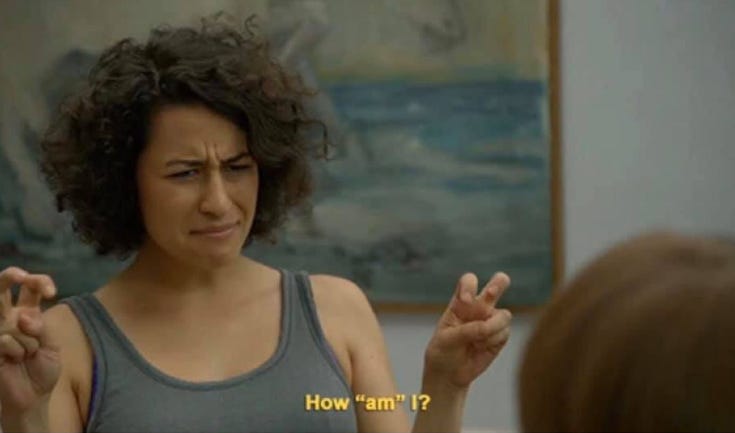
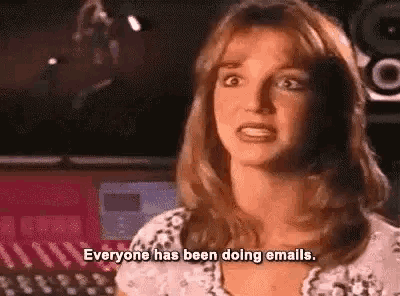

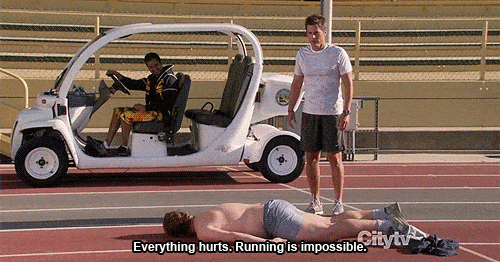

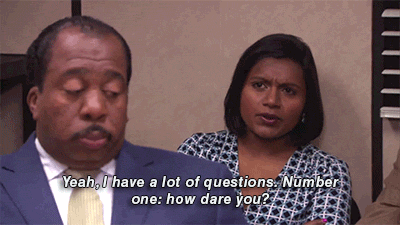

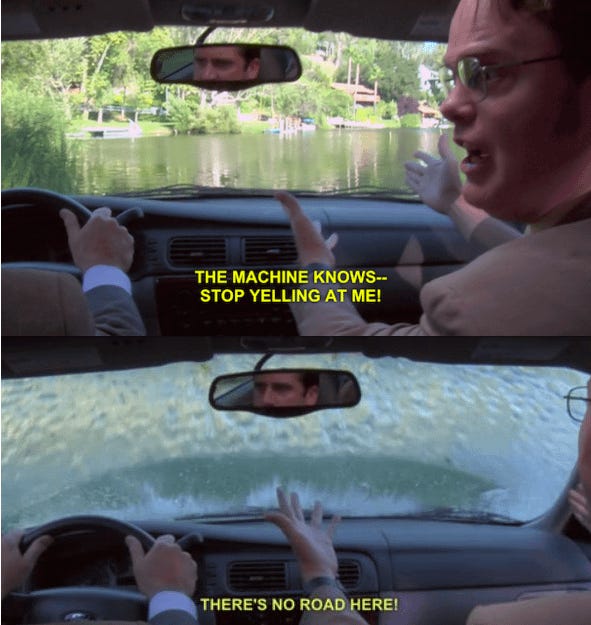
So refreshing to see somebody address the moral question at the heart of it all.
We've all been lured into debating whether we can do something with AI when the real question is whether we should.
Brilliant. Incidentally 🙄... I have something regularly delivered by 24hr "signed for" mail, and failed to notice that autocorrect had filled my name in as "Hilarious Coombes". Postpeople evidently enjoy LOUDLY ANNOUNCING on office door intercom, "PARCEL FOR HILARIOUS COOMBES??"... I anticipate my CBE for services to bored postal workers to be Imminent.